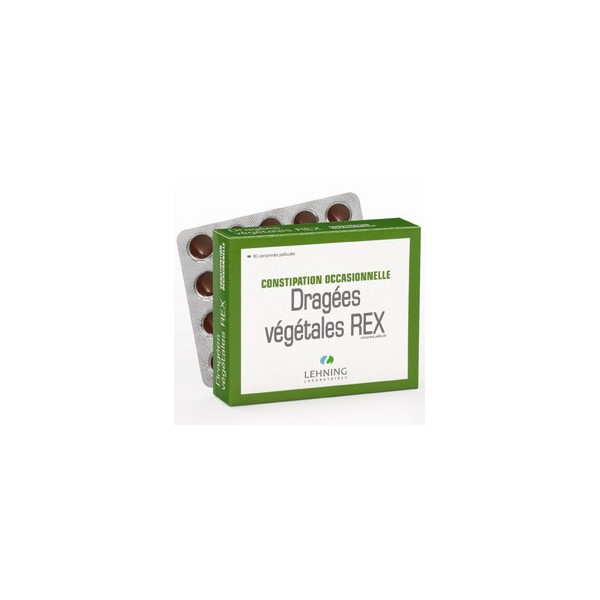1. NAME OF THE MEDICINAL PRODUCT
REX VEGETABLE DRUGS, film-coated tablet
2. QUALITATIVE AND QUANTITATIVE COMPOSITION
Hydroalcoholic dry extract of borage ........................... 20,000 mg
Dry aqueous extract of Cascara ......................................... 24,000 mg
Notable excipient: Lactose For one film-coated tablet.
For a full list of excipients, see section 6.1.
3. PHARMACEUTICAL FORM
Film-coated tablet.
4. CLINICAL DATA
4.1 Therapeutic indications Symptomatic treatment of constipation.
4.2. Dosage and administration 1 to 3 tablets after the evening meal, starting with one tablet. Treatment should be of short duration (8 to 10 days maximum).
4.3. Inflammatory organic diseases (ulcerative colitis, Crohn's disease, etc.). Occlusive or subocclusive syndrome, abdominal pain syndromes of undetermined cause. Children under 12 years of age (unless prescribed by a doctor). Associated treatment with: - antiarrhythmics giving torsades de pointes: bepridil, class A antiarrhythmics (quinidine type), sotalol, amiodarone. - lidoflazine, vincamine (non-anti-arrhythmic drugs giving torsades de pointes).
4.4 Special warnings and precautions for use Warnings This medicine contains lactose. Its use is not recommended in patients with galactose intolerance, lapp lactase deficiency or glucose or galactose malabsorption syndrome (rare hereditary diseases). Drug treatment of constipation is only an adjunct to hygienic dietary treatment: - enrichment of the diet with vegetable fibres and drinks. - Physical activity, re-education of exoneration. In children, prescription should be exceptional as it may interfere with the normal functioning of the exoneration reflex. Prolonged use of anthracenic principles is not recommended as it can lead to : - "laxative disease" with severe functional colopathy, rectocolic melanosis, hydroelectrolytic anomalies with hypokalaemia. It is very rare. - a situation of "dependence" with regular need for laxatives, need to increase the dosage and severe constipation in case of withdrawal. This dependence, which varies from patient to patient, may be created without the doctor's knowledge.
4.5. Interactions with other medicinal products and other forms of interaction Anti-arrhythmic drugs giving torsades de pointes: bepridil, class A antiarrhythmic drugs (quinidine type), sotalol, amiodarone. - Lidoflazine, vincamine (non-antiarrhythmic drugs giving torsades de pointes). Torsades de pointes (hypokalemia is a contributing factor as well as bradycardia and a pre-existing long QT interval); use a non-stimulant laxative. Combinations subject to precautions - digitalis: hypokalaemia favours the toxic effects of digitalis. - other hypokalemic agents: amphotericin B (I.V. route) corticosteroids (gluco, mineralo: systemic route), tetracosactide, hypokalemic diuretics (alone or combined). Increased risk of hypokalaemia (additive effect). Monitoring of kalaemia and if necessary correction. Use a non-stimulant laxative. 4.6. Pregnancy and lactation There are no reliable data on teratogenesis in animals. Clinically, no particular malformative or fetotoxic effects have been observed to date. However, the follow-up of pregnancies exposed to bourdaine and cascara is insufficient to exclude any risk. Consequently, as a precautionary measure, it is preferable not to use REX VEGETABLE DRAGES during pregnancy. The use of this medicine is not recommended during breast-feeding.
4.7. Effects on ability to drive and use machines Not applicable.
4.8. Undesirable effects Possibility of diarrhoea, abdominal pain especially in patients with irritable bowel syndrome, possibility of hypokalaemia.
4.9. Overdose Symptoms: diarrhoea. Action to be taken: correction of possible hydroelectrolytic disorders in the event of very significant fluid loss.
5. PHARMACOLOGICAL PROPERTIES
5.1. Pharmacodynamic properties Anthraquinonic stimulant laxative. Increases colonic motricity and modifies intestinal hydroelectrolytic exchanges. Time to onset of action: 8 to 12 hours.
5.2. Pharmacokinetic properties Anthraquinones act on the small intestine and colon, probably after bacterial hydrolysis in the colon.
5.3. Preclinical safety data Not available.
6. PHARMACEUTICAL DATA
6.1. List of excipients Lactose, microcrystalline cellulose (Avicel pH 102), colloidal hydrated silica, silicic acid (Tixosil 33 J), magnesium stearate, opaglos regular NA-7150(1), opadry II BROWN 85F36637(2). (1) Composition of Opaglos regular NA-7150: Shellac, povidone. (2) Composition of Opadry II BROWN 85F36637: Black iron oxide, red iron oxide, talc, macrogol, polyvinyl alcohol.
6.2 Incompatibilities Not applicable.
6.3. Shelf life 3 years.
6.4. Special precautions for storage No special precautions for storage.
6.5. Nature and contents of packaging 40 tablets in a blister pack (PVC/PVDC/Aluminium).
6.6. Special precautions for disposal and handling No special requirements.
7. MARKETING AUTHORISATION HOLDER
Laboratoires LEHNING 3, rue du Petit Marais 57640 Sainte Barbe


 100% secure payment, Customer Satisfaction
100% secure payment, Customer Satisfaction
 Order shipped within 24 hours from Monday to Friday*
Order shipped within 24 hours from Monday to Friday*



